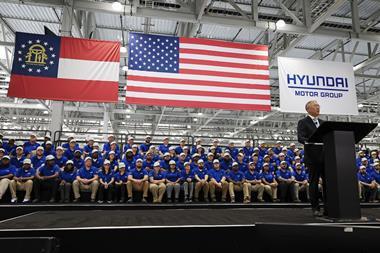
Slovakian plants in Trnava for PSA, and in Zilinia for Kia, have been forced to stop production of cars and engines from Thursday last week because the gas dispute between Russia and Ukraine has cut off gas supply to the country.
Hyundai’s new Czech plant in Nosovice, 90 kms away from Zilinia, has also been forced to stop production as of today because it depends on the delivery of engines from Zilinia, according to Petr Vanek, Head of Public Relations for Hyundia Motor Manufacturing Czech.
Slovakia receives most of its energy from Russia through pipelines in the Ukraine. The Czech Republic’s supply is not directly affected by the dispute, since it receives most of its gas supply from Norway, or else from Russia via a pipeline in Poland.
However, Hyundai-Kia’s manufacturing and logistics strategy means that the plant in Nosovice, which began production of the i30 hatchback in November, normally keeps only around a one-day stock of engines. Two truck deliveries from Kia supply engines for each shift just-in-time, while Hyundai sends transmissions to Zilinia.
Tomas Polacek, Senior Specialist, Purchasing department, told Automotive Logistics that the company had a small supply of engines imported earlier from Korea, and so was able to continue production only until it exhausted this supply yesterday. Both manufacturers must now wait until the dispute is resolved to resume production. Vanek said that workers in Nosovice are paid 68 per cent of their salary for days the plant is shutdown.
Both Hyundai and Kia had already lowered production because of the dip in demand, with Hyundai cutting its working week by 20 per cent to four days, and Kia shortening its working day by 25 per cent to six hours, according to Vanek. He told Automotive Logistics that plans for a second shift in Nosovice have been postponed for now.
HMMC also quietly shed about 55 workers yesterday from its force of around 2,000. Vanek said that while the redundancies were partly in response to the economic situation, yesterday was the last working day of the plant’s three-month probation period for around 430 employees. “We told managers to be vigilant in selecting those workers who were not meeting our standards,” he said.
He added that the company had let go of a similar number of workers in each of the past two months as well, but the difference this month would be that they would not be replaced.

























![Global[1]](https://d3n5uof8vony13.cloudfront.net/Pictures/web/a/d/s/global1_726550.svgz)










